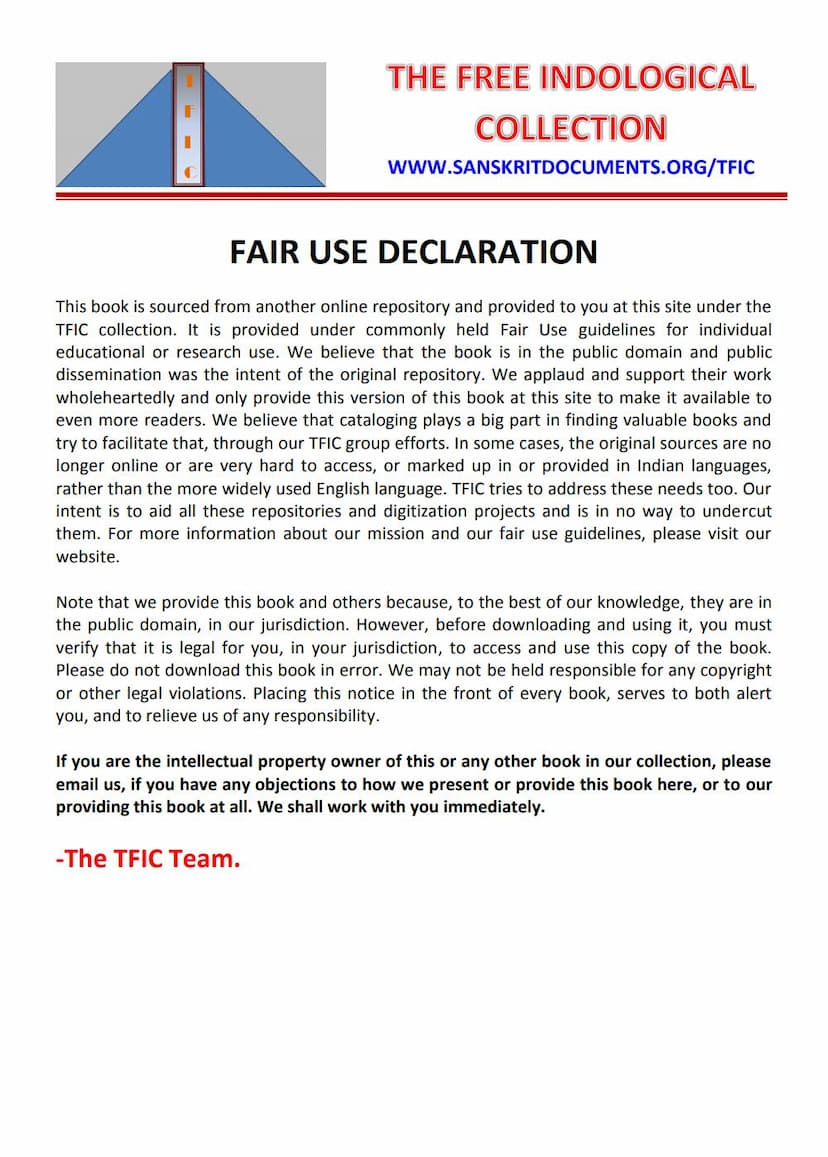Karmpath
Added to library: September 2, 2025

Summary
This document is a Jain text titled "Karmpath" by Premnarayan Tandan, published by Vidyamandir, Ranikatra, Lucknow. It is a collection of four one-act plays.
Fair Use Declaration: The initial pages include a declaration by "The Free Indological Collection WWW.SANSKRITDOCUMENTS.ORG/TFIC," stating that the book is provided for individual educational or research use under Fair Use guidelines. They believe the book is in the public domain and are providing it to make it more accessible.
Book Overview:
- Title: Karmpath (कर्मपथ)
- Author: Premnarayan Tandan (प्रेमनारायण टंडन), M.A., Sahitya Ratna
- Publisher: Vidyamandir, Ranikatra, Lucknow (विद्यामंदिर, रानीकटरा, लखनऊ)
- First Edition: Vijayadashami, 1650 (Vikram Samvat), Price - 1.25 Rupees.
Contents (सूची):
- Karmpath (कर्मपथ)
- Rogi ke Bachche (रोगी के बच्चे)
- Lekhak ki Patni (लेखक की पत्नी)
Critical Review (by Kalidas Kapoor): The reviewer, Kalidas Kapoor, praises Premnarayan Tandan as a successful critic and creator of literary works. He describes each of the four one-act plays in the collection:
-
Karmpath (कर्मपथ):
- Written in unrhymed verse (अतुकांत पद्य).
- Based on a small portion of a Rigvedic saga.
- Features Acharya Brihaspati (सुरगुरु) instructing his son, Kach, to seek knowledge from Shukracharya (the guru of the demons) to learn "Sanjeevani Vidya" (the science of reviving the dead, here interpreted as modern science/technology).
- The play's message is a call to Indian youth to embrace the path of action ("Karmpath") and to acquire scientific knowledge to protect their independence, especially in the context of a newly independent India.
- Kach questions the wisdom of learning from enemies, but Brihaspati explains that knowledge grows through sharing and that hiding it leads to stagnation, contrasting the Indian approach with Western scientific progress.
- It can be easily staged within an hour.
-
Rogi ke Bachche (रोगी के बच्चे):
- Written in prose.
- Depicts a poignant scene of a sick writer's family life.
- Features three children: Sheela (10 years old), Satish (7 years old), and Rakesh (elder brother).
- The play highlights the children's innocent yet profound understanding of their father's illness and poverty.
- It skillfully portrays child psychology.
- The dialogue contrasts their plight with that of wealthier neighbors' children, making their situation more heartbreaking.
- The climax focuses on how children perceive God and seek solace from Him. The reviewer notes that the play ends with the audience echoing the children's wish for their father's recovery.
- Considered suitable for staging in boys' schools.
-
Lekhak ki Patni (लेखक की पत्नी):
- Written in prose.
- Reminds the reviewer of Sudarshan's "Kavi ki Stri" (The Poet's Wife), but with a different outcome.
- Unlike the fallen wife in Sudarshan's work, the writer's wife in this play is saved from ruin through the efforts of her friends, Malti and Niranjana.
- She comes to appreciate her husband's worth, as exemplified by her request for a Khadi sari instead of silk, and her apology for past mistakes.
- Considered suitable for staging in girls' schools after "Rogi ke Bachche."
-
Jesus as an Indian Guru (Implied by the description of the fourth play):
- Written in prose.
- Depicts Jesus carrying a humanitarian message from his birthplace and propagating it in his homeland.
- One of his disciples helps him reach the cross, and Jesus forgives him.
- The scene ends before the crucifixion with a curtain fall.
- The reviewer compares it to "Mahatma Isa" by Bachchan Sharma 'Ugra' but notes that this play can be staged within an hour, unlike Ugra's work which takes 3-4 hours.
- It is suggested that staging this play in Christian schools and others would be entertaining and reinforce lessons relevant to Mahatma Gandhi's teachings in modern times.
Summary of the first play, "Karmpath": The play opens with Acharya Brihaspati in his hermitage, contemplating the defeat of the gods in a war against the demons. He is disgraced and has resigned his post after being blamed by Suresh. He is burdened by the responsibility of protecting his homeland. He reflects on his son, Indra, and his past interactions with him. He then thinks of his devoted son, Kach, and decides to sacrifice him for the greater good of the motherland. He prays to God, asking that his son fulfills his duty to the motherland, even if it means sacrificing his life.
Kach arrives, distraught by his father's disgrace and eager to avenge it. Brihaspati calms him, stating that personal vengeance is not the solution. He explains that instead of engaging in conflict, Kach should seek "Sanjeevani Vidya" from Shukracharya, the guru of the demons, to strengthen their own side. Kach is initially skeptical, wondering if they will be betrayed, but Brihaspati emphasizes the importance of sharing knowledge and the consequences of hoarding it.
Brihaspati then imparts a powerful message to Kach, calling upon the youth to listen to the cries of their mothers and the oppressed, to shed tears of blood no longer, and to awaken to their duty towards their country. He declares that the youth are the pillars of their nation, the hope of their mothers, and the very essence of hope itself. He urges them to learn science (Sanjeevani Vidya) from modern Shukracharyas to protect their newfound freedom.
Kach understands the mission and vows to fulfill his duty, even at the cost of his life. He promises to bring Shukracharya to them to learn the Sanjeevani Vidya. The play concludes with Kach's resolve and Brihaspati's blessing, highlighting the theme of duty and self-sacrifice for the nation.